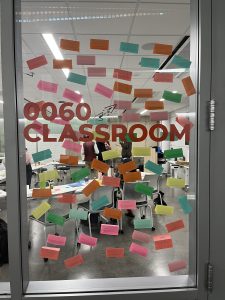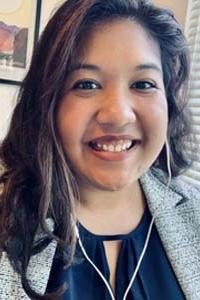Jackie Marie Abing (Sociocultural & Linguistic Anthropology) is a member of the 23–24 graduate cohort for “Improvise and Intervene,” the second Interseminars project funded by the Mellon Foundation. They share about their experiences with Interseminars below. The Interseminars Initiative is gearing up for the third round of the grant in 24–25! Learn more about Interseminars. View the Graduate Fellowship Call for Proposals.
How has your understanding of “improvisational practice” evolved over the course of this fellowship so far?
Sometimes, “improvisation” can get conflated with being unprepared, and that isn’t true at all! Improvisation is the actualization of all prior experience, relationships, beliefs and feelings, all emerging in a singular moment of decision making. Improvisation, particularly when done collaboratively, can also be far more intimate than I expected. When Damon Locks and Tara Willis came to campus earlier in October, we did a workshop together to challenge our assumptions about improvisational practice. One of the most important lessons I took from that workshop was that improvisation is laden with political power.
Jackie Marie Abing“Improvisation is not always about creating freely. While this does occur to some extent, improvisation is also about creating amidst, or even despite, constraint.”
Damon and Tara had us read Danielle Goldman’s I want to Be Ready (2010), and in that book, Goldman argues that improvised dance “involves literally giving shape to oneself by deciding how to move in relation to an unsteady landscape. To engage oneself in this manner, with a sense of confidence and possibility, is a powerful way to inhabit one’s body and to interact with the world.” When we think about improvisational practice in this way, we can start to name and give power to the decisions made on the ground by people trying to, quite literally, survive everyday life. Discourses such as “making it up as you go” can have a humorous quality to them, but materially doesn’t do justice to the pressure of having to make decisions on the go as political crises emerge. Improvisation as a theory and methodology gives us a way to honor the work of those resisting and fighting for a freer, more just world. Ruth Wilson Gilmore tells us that “freedom is a place” and maybe improvisation can help us get there. As this fellowship continues, I want to be more intentional about understanding how contexts of constraints or “tight spaces” (Goldman 2010) are also producing conditions for world making, and where practices of freedom might fit into these worlds.

How has the Interseminars initiative impacted the way you approach your research?
When I first applied to this fellowship, I was really interested in how we could use improvisation as an affective and material practice. My work looks at the unfolding of El Salvador’s legal state of exception that began in March 2022. This regime has suspended constitutional protections and has mass-incarcerated mostly men and male youth accused of being gang members. While these measures were initially authorized for 30 days, the state of exception in El Salvador has been continually renewed. Within this context, I wanted to understand how transnational families between the U.S. and El Salvador were improvising in order to navigate a new legal terrain where all prior “rules” had suddenly changed.
Jackie Abing“Working with Interseminars has burst this project open, and allowed so many new questions to blossom. Reading and working through theories of improvisation from a dance perspective in particular has opened my eyes to thinking about movement, gesture, and performance.
While I still am invested in the legal phenomena of state of exception, I also seek to understand how notions of innocence and criminality are becoming aesthetically defined, and how both activists and everyday people physically inhabit and move within and around such definitions.”
Can you describe a group interaction or activity from Interseminars that has been particularly memorable?
We’ve done many awesome things as a cohort, but my favorite activity was the community building aspect of our past summer intensive! Before we first met as a group, our conveners, Maryam Kashani, Junaid Rana, and Eli Velásquez Estrada asked us to bring one object that represents us. When we arrived, each of the fellows placed our objects on the table, and we created this community altar to represent our coming together. It was beautiful to see how differently each of us interpreted the activity—some people brought books, others brought toys, journal articles, art supplies, or other objects from our personal lives. I had known a few of the members in my cohort before this program, but seeing all of our objects displayed made me realize that there’s so much more to each of us than what can be revealed in a typical classroom setting.
Jackie Abing“Later in the week we used these objects to talk about our personal ‘Why’ – the motivations and passions that have brought us to this space. In a traditional seminar, maybe these types of intimate conversations arise between a couple of students in private, but it felt like our summer intensive was designed to bring all of us together as a community. We weren’t here to compete against each other, we were all here to grow and create together.”
How will you bring interdisciplinary collaboration into the next phase of your graduate school experience?
Something that I’ve realized is that “interdisciplinary collaboration” has been discussed at length for decades within academia. During our summer intensive, Dr. Siobhan Somerville, one of the original designers of the Interseminars program, explained that this program alone has been in the making for nearly a decade at UIUC. We are in an exciting moment where interdisciplinarity is being materially supported by our university and students are being given the structural support to pursue experimental projects in an experimental classroom. I want to take my experience from Interseminars and begin to pair the unthinkable or unexpected.
